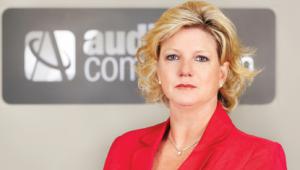By Marcine Waterman | 1 September 2012
As the Audit Commission prepares to bow out, its incoming controller explains how it is going back to its regulatory roots while continuing to protect public money and audit quality

By next year, the Audit Commission will have shrunk from an organisation topping 2,000 staff to one with around 70 people. Already gone are most of the inspection and value-for-money teams that helped local government and other public services raise their game and secure better value. At the end of October, the Audit Practice will join them, closing its doors for the last time as its staff move to private firms. An immense pool of talent is trickling away, and I feel I owe it to all those former colleagues to uphold the principles and -professionalism that are their hallmark.
Research, analysis, reporting and publishing will -continue but on a smaller scale, focused on audit outcomes, counter fraud work and intelligence gathered from value-for-money profiles.
The commission that remains faces a very changed and challenging future indeed. But then, so does England’s public audit market, which will become wholly private when the Audit Practice closes.
Public audit has a hugely valuable purpose – to -protect the public purse. This responsibility is now moving closer to those who hold the purse strings – councils and other local public bodies.
So the commission must aim for a smooth handover that gives all stakeholders the assurance they need. That, in essence, is the largest part of my new job as controller of audit. The challenge is in -managing the change and making it as seamless as possible.
We have made an encouraging start. Following the largest outsourcing procurement ever carried out by the commission, in April we were able to announce lower audit fees – saving the larger local public bodies £250m over five years, a 40% cut for around 800 of them. In a separate procurement, contracts were awarded to audit England’s almost 10,000 parish and town councils and other small local public bodies. Around half the -councils will have their fees cut by 30%, and the rest will pay nothing.
Of course, securing these benefits for the lifetime of the contracts is a one-off achievement reflecting the huge economies of scale we were able to achieve from this final, national bulk purchase of audit. The outcomes were good – lower fees at a time of great pressure on public spending, and a more diversified market.
The procurements completed, our focus moved to the appointment process. We organised a programme of 18 introductory events in April and May, hosted by the successful firm for each contract area.
These get-togethers were logistically challenging, and we put a lot of time and resources into organising them. But they proved to be immensely valuable, well attended and well received as forums for discussing the changing world of public audit. We detected a clear appetite for audited bodies to get to know their new auditor early.
In the feedback from more than 500 audited bodies, there were some recurring concerns. The first was whether audit quality could be sustained at the new low fee levels, with fears that a 40% fee cut would lead to a reduction in the amount of time spent on an audit.
Our response is that the ability to deliver high-quality audits was a core criterion in the robust assessment of each bid as part of the procurement. The commission will continue to monitor and regulate the audit regime, including reporting publicly on the performance of the firms under the contracts. And we will also check on the client experience after the first year of the contracts.
Another query was whether reduced fees would -continue over the five-year life of the contracts. Audited bodies were worried firms might charge extra fees or seek to sell consultancy services to make up the shortfall.
We can reassure audit clients that the fee scales can be increased only in discussion with the audited body concerned and with the approval of the commission. It is the commission that sets individual bodies’ fees, not the firms, and any proposed variations to the fee would need to be supported by robust evidence that additional work was necessary for the firm to fulfil its responsibilities under the Code of Audit Practice.
Non-audit services such as consultancy above a -de -minimis threshold (under revision but currently the higher of £30,000 or 20% of the total) also have to be approved by the commission. Rules and regulations around the provision of non-audit services go further than the Auditing Practices Board’s Ethical Standards because they must reflect the wider scope of public audit.
Continuity of audit teams was another widely held concern. The transfer of staff from the commission’s Audit Practice will allow the private firms to provide continuity where appropriate, but they are planning to make use of ‘mixed teams’ to promote the integration of -transferring staff. So change – that old theme – is likely.
Part of my aim in smoothing the way to the new audit regime is to make sure the commission’s expertise is brought to bear on the Draft Local Audit Bill, currently out for consultation. Of course, the changes have already reached a critical momentum in the outsourcing work described above.
We will be working very closely with the Department for Communities and Local Government to help improve the Bill, clause by clause.
Some might view this as like -checking the punctuation on your own death warrant. But I don’t. I feel strongly that the public interest is best served by the commission helping to make this legislation as good as it can be, so that the new -framework of local public audit will be robust and sustainable.
Although the new commission will be a much smaller organisation, it will not have changed beyond recognition, as it will still retain many of the same responsibilities. It will have a government-appointed Board of Commissioners, and in October it will have a new chair as Michael O’Higgins’ second term comes to an end.
The commission will continue to regulate the local public audit market and monitor the performance of the firms providing audit services. Its regulatory role is critical to holding the firms to account, and making sure public bodies receive high-quality and effective audit services that provide value for money to the local taxpayer.
Until the commission is finally -abolished by -legislation, it will continue to fulfil its statutory functions – appointing auditors to local government and NHS bodies in England, setting a ‘scale fee’ for each audit and approving any proposals for variations to this fee, and making arrangements for the certification of grant claims and returns submitted by local bodies.
We will also continue to carry out data-matching through the extremely effective National Fraud Initiative, and publish national studies such as Tough times and our annual Auditing the accounts and Protecting the public purse reports.
Here in the commission we are used to change. Indeed, back in the 1980s, then Environment Secretary Michael Heseltine conceived it as an instrument of change, a catalyst for improvement at a time when there were concerns about the use of public funds by councils.
The commission made a name for itself as a source of authoritative, fact-based expertise, a reputation built by the -talented and dedicated people who worked for it, often of the highest calibre in their fields.
You can’t keep good people down, so many have taken their talents to other areas of public service, where they will continue to make a difference. Those that are left will continue to work with government, the Local -Government -Association, the National Audit Office, the Financial Reporting Council and the professional institutes to ensure the -transition over the next few years is as smooth as possible.
Change in all walks of life is natural, inevitable and irresistible. It can also be stressful, unsettling and unwelcome. I am looking forward to working with colleagues and commissioners on managing the changes and challenges ahead. We are facing a role that will become narrower and more focused, but one that is equally important and that we must continue to carry out well.
The Audit Commission is heading back to its future, as the public audit regulator it was always intended to be.
Marcine Waterman became controller of audit at the Audit Commission on September 1. She was previously director of audit policy and regulation. This article first appeared in the September issue of Public Finance
From the White House to Westminster
Marcine Waterman brings wide experience of protecting public money
from both sides of the Atlantic. She sums up her background here
I represent quite a change for Westminster management. My hometown is Covina in Los Angeles County. You’ve probably never heard of it, but you’ve almost certainly drunk its orange juice.
But amid all the Westminster suits, I think I’ve earned my stripes. At Ernst & Young in California, I was responsible for consultancy services for local government, children’s services, health care agencies, planning and development agencies, social service departments and charitable bodies.
I joined the Audit Commission in 1993, and since 2007 have managed its Audit Policy and Regulation Directorate. I was a performance field auditor, and have been involved in most of the commission’s main change programmes, including data quality, fire modernisation verification, Best Value, and market testing.
I also led on the commission’s largest, most complex outsourcing procurement.
Before all that, I was with the Office of Budget and Management in then president Ronald Reagan’s White House, producing regular reports for senior White House officials and formulating strategy for domestic legislation.
The US has arguably the most privatised public sector in the modern world, so I am not stepping into completely fresh territory here.



















